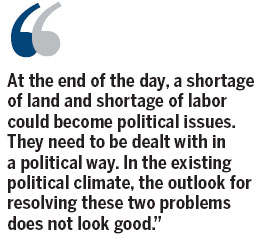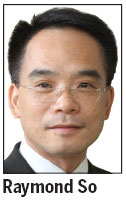Land and labor shortage causing major problems
Updated: 2014-03-13 08:26
By Raymond So(HK Edition)
|
|||||||
In standard economics textbooks, the four factors of production are land, labor, capital and entrepreneurship. They are called factors of production because we need them in economic production. In Hong Kong, capital is not a concern as we have a sound financial system. Also, the accumulation of capital through savings in the past provides a good supply of capital. In terms of entrepreneurship, Hong Kong businesspeople are flexible and proactive. The developments of Hong Kong in past decades demonstrate that entrepreneurship is a key factor to Hong Kong's success. What are left from the four factors of production are land and labor. Paradoxically, these two factors will be the greatest constraints to Hong Kong's development in future.
Land is always a scare resource in Hong Kong. Many people nowadays complain about insufficient housing, which is also partly because of a shortage of land. For economic developments, we also need land for commercial buildings and public infrastructure. Without an adequate supply of land, people will have to pay a high price for housing, which is an indirect land tax. Businesses face high operating costs and the lack of land also makes important infrastructure difficult to build.

In the old days, when society was not so conscious about environmental protection, land could be reclaimed from the sea. The current Sha Tin, Tseung Kwan O and Tuen Mun new towns are built on reclaimed land. Even many coastal areas of Victoria Harbour are reclaimed land. That we need land for economic development is well established. However, it does not mean we can now obtain land easily, because the current political climate makes the supply of land difficult. Many people are against all sorts of development. The acronym BANANA (Build Absolutely Nothing Anywhere Near Anything) vividly describes the mindsets of many anti-development groups. Given the vocal nature of these voices, the government is having great difficulty locating enough land for development. For instance, the East Lantau project is a good concept, but again, it is subject to challenges from concern groups. It will not be a surprise if people find there are judicial reviews against the East Lantau project. Under these conditions, the problem of scarcity of land will get more severe, which will inevitably hinder Hong Kong's development.
Apart from a shortage of land, another problem is the shortage of labor. The current unemployment rate in Hong Kong is slightly higher than 3 percent, which is considered as full employment by conventional standards. Rising labor costs are a direct consequence of the labor shortage. There have been some news reports recently saying a dishwasher can earn a monthly salary of HK$16,000 or higher. And, the shortage of labor is across disciplines and not applicable to one sector. Take the hotel industry as an example. People in the industry say that instead of having an unemployment problem, they are having a negative unemployment problem. Construction workers are also in short supply, which drives up construction costs and causes delays.
When we look at the unemployment problem more carefully, we can see the problem is partly due to a mismatch of labor demand and supply. Many young people nowadays do not want to do dirty jobs, but they are not yet qualified for senior positions. Also, some sectors have a labor force which cannot be transferred to other sectors. Many of these problems originate from a lack of sound planning.

Nevertheless, it is unfair to blame the government for this. The government has stressed re-training and re-development of labor. The undiversified nature of Hong Kong's economic development, with an over-concentration on traditional pillars, makes the problem of demand and supply of labor difficult to solve. The bottom line is that without adequate labor, we simply cannot have strong economic growth.
These two problems are unlikely to be resolved soon. As mentioned above, increasing the land supply is difficult. And getting more labor is equally difficult - if not more so. When the labor supply is short, a simple idea is to have more imported labor. However, this is not practical as labor unions will try to resist this. We already have a system of importing labor. However, it has to balance the interests of workers and the employers. Very often, it takes many months to import labor. We simply cannot expect imported labor to solve the problem in a speedy way.
At the end of the day, a shortage of land and shortage of labor could become political issues. They need to be dealt with in a political way. In the existing political climate, the outlook for resolving these two problems does not look good.
The author is dean of the School of Business at Hang Seng Management College.
(HK Edition 03/13/2014 page1)